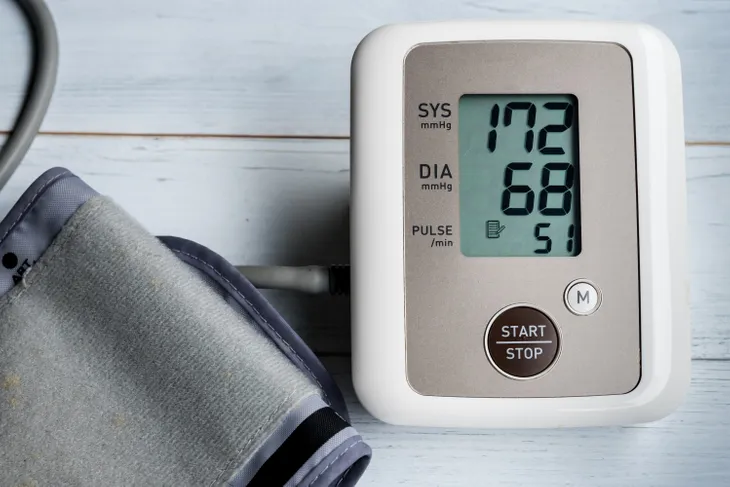Understanding blood pressure (BP) ranges is especially important for people living with cardiovascular disease. Having blood pressure that is either too high or too low can be extremely bad for your health. However, high blood pressure (hypertension) is particularly dangerous, as it can increase a person’s risk of having a heart attack or stroke.
Age is one of the main factors affecting blood pressure. This means that what constitutes a “normal” or safe blood pressure range changes slightly as we get older.
What Do Blood Pressure Readings Mean?
Blood pressure is a medical term which refers to the pressure imposed on the walls of arteries and veins, as blood circulates the body. Most people do not know what the numbers of a blood pressure reading actually mean, so we will explain that briefly here.
Blood pressure readings consist of two numbers which are usually separated with a “/”. For example, “120/60”. The first of these numbers refers to systolic blood pressure, or to put it simply, the pressure on artery walls when the heart is beating or pushing blood around the body. The second number refers to diastolic blood pressure, or the pressure on artery walls while the heart is resting between beats.
Generally, a healthy adult should have systolic blood pressure of lower than 120 and a diastolic blood pressure of lower than 80. However, doctors may outline a different ideal range for much older adults or those living with chronic health conditions.
Why Does Normal Blood Pressure Range Change with Age?
What is generally considered to be a healthy blood pressure range increases with age. This is because changes in the cardiovascular system as a result of the aging process are inevitable, to a degree. Even if you remain active, eat well, and avoid unhealthy habits like smoking, aging leads to a gradual stiffening of large arteries, which can increase blood pressure.
Of course, this does not mean lifestyle choices are totally irrelevant. A 60-year-old who has consistently lived a healthy lifestyle may have lower blood pressure than a 30-year-old who has not.
What Are the Blood Pressure Categories?
Medical professionals describe blood pressure readings according to the following categories:
- Normal: Most doctors consider a blood pressure of lower than 120/80 to be normal.
- Elevated: If diastolic blood pressure remains below 80 but systolic blood pressure is between 120 and 129. Having prolonged, elevated blood pressure increases a person’s risk of developing full-blown hypertension.
- Stage 1 Hypertension: If a person’s diastolic blood pressure is between 80 and 89, and their systolic blood pressure is between 130 and 139. People with hypertension have a moderately increased risk of developing heart disease and may be asked to take medication.
- Stage 2 Hypertension: If a person’s blood pressure is consistently 140/90 or above, this is known as stage 2 hypertension. It is extremely likely that people within this category will need to manage their condition with medication.
- Hypertensive Crisis: A situation in which a person’s blood pressure suddenly becomes higher than 180/20. This requires immediate medical attention.
Normal Blood Pressure Range by Age and Sex
Normal blood pressure is also affected by sex, as men have a slightly higher healthy range than women. The normal BP ranges for men and women of different ages are listed below.
Men
21-25 years old: Systolic BP: of 120.5, Diastolic BP of 78.5
26-30 years old: Systolic BP: of 119.5, Diastolic BP of 76.5
31-35 years old: Systolic BP: of 114.5, Diastolic BP of 75.5
36-40 years old: Systolic BP: of 120.5, Diastolic BP of 75.5
41-45 years old: Systolic BP: of 115.5, Diastolic BP of 78.5
46-50 years old: Systolic BP: of 119.5, Diastolic BP of 80.5
51-55 years old: Systolic BP: of 125.5, Diastolic BP of 80.5
56-60 years old: Systolic BP: of 129.5, Diastolic BP of 79.5
61-65 years old: Systolic BP: of 143.5, Diastolic BP of 76.5
Women
21-25 years old: Systolic BP: of 115.5, Diastolic BP of 70.5
26-30 years old: Systolic BP: of 113.5, Diastolic BP of 71.5
31-35 years old: Systolic BP: of 110.5, Diastolic BP of 72.5
36-40 years old: Systolic BP: of 112.5, Diastolic BP of 74.6
41-45 years old: Systolic BP: of 116.5, Diastolic BP of 73.5
46-50 years old: Systolic BP: of 124, Diastolic BP of 78.5
51-55 years old: Systolic BP: of 122.5, Diastolic BP of 74.5
56-60 years old: Systolic BP: of 132.5, Diastolic BP of 78.5
61-65 years old: Systolic BP: of 130.5, Diastolic BP of 77.5
What Causes Low Blood Pressure?
Blood pressure that falls well below the normal ranges outlined above can result in the following symptoms:
- Dizziness
- Nausea
- Fainting
- Poor concentration
- Blurry vision
- Shallow breathing
- Cold or clammy skin
- Extreme fatigue
Low blood pressure (hypotension) can occur as a result of:
- Pregnancy
- Prolonged bed rest
- Nutrient deficiencies
- Certain medications
- Blood loss
- Thyroid problems
- Infections
- Allergic reactions
What Causes High Blood Pressure?
High blood pressure can lead to a variety of health complications, including:
- Vision disturbances
- Stroke
- Heart attack
- Heart failure
- Kidney failure
- Dementia
- Erectile dysfunction
High blood pressure can occur as a result of:
- Smoking
- Obesity
- Lack of exercise
- Too much salt in the diet
- Excessive alcohol consumption
- Stress
- Genetic factors
- Kidney disease
Treatment Options
Speak to your doctor if you are concerned about your BP. They will be able to measure your BP using an inflatable cuff which fits around your upper arm or wrist.
Low blood pressure is difficult to treat with medication, which means your physician may recommend lifestyle changes to help you manage symptoms. High blood pressure can be treated very effectively with a range of medications and adjustments to lifestyle. Some of the most common pharmaceutical treatments are:
- Beta blockers
- Calcium channel blockers
- Angiotensin II receptor blockers
- Angiotensin-converting enzyme inhibitors
- Diuretics
Managing extremely high blood pressure may not be possible with lifestyle changes alone — at least in the short term. However, increasing exercise and taking steps to improve your diet can have a positive long term effect and should reduce your reliance on medication over time.











